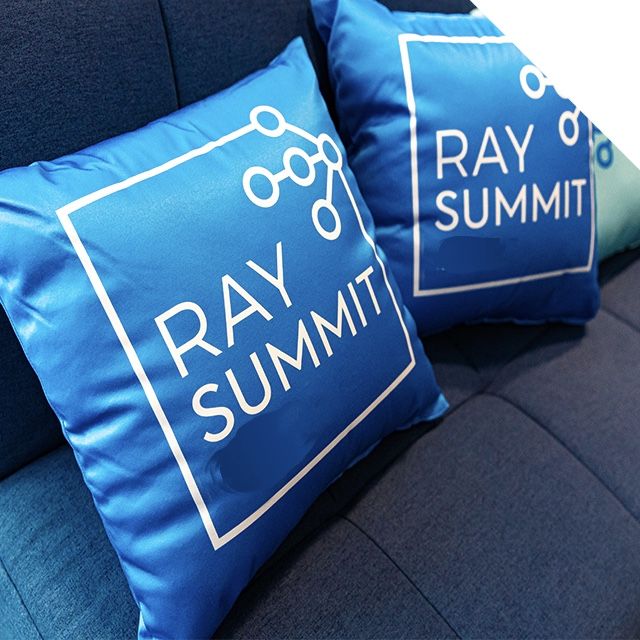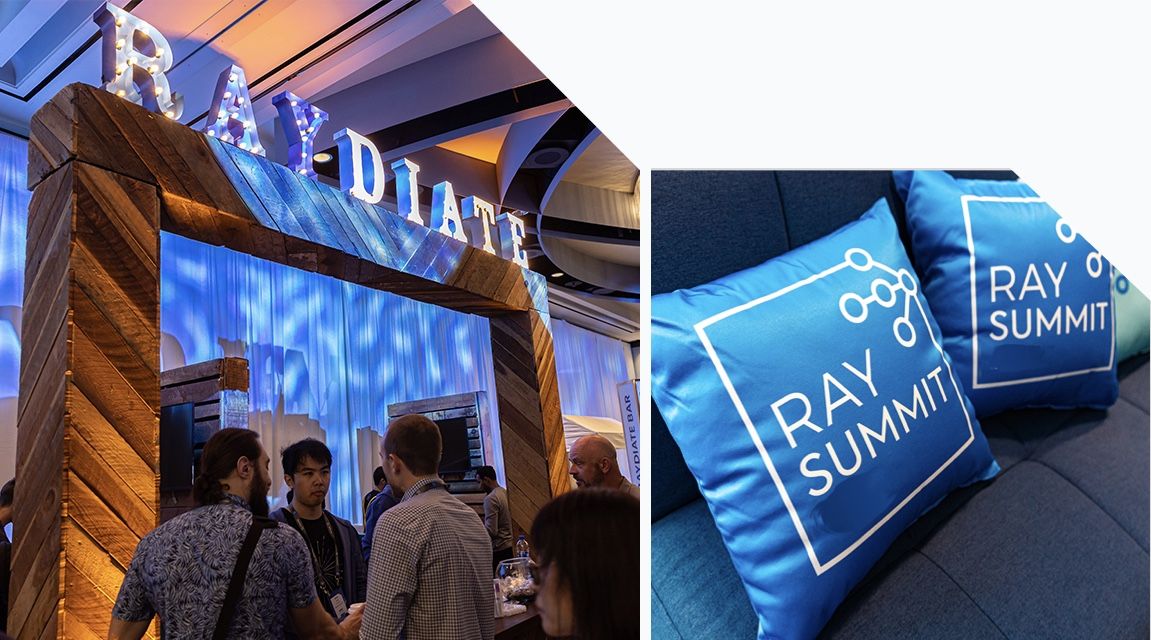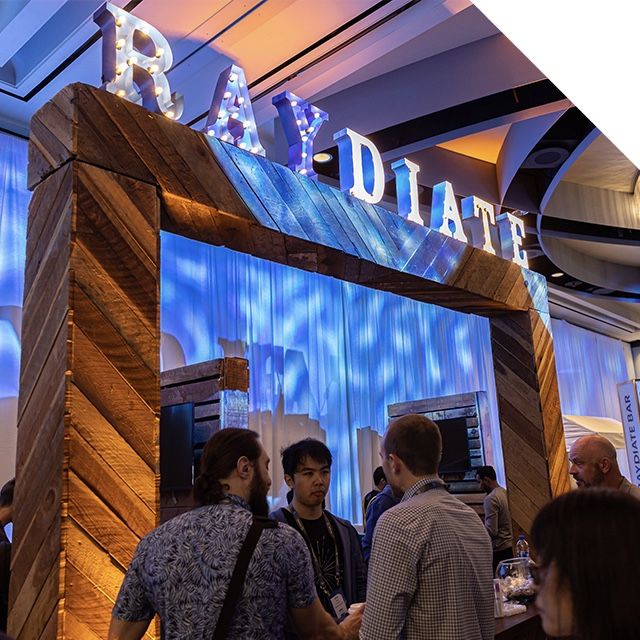8:30 AM


In-Person Agenda
Filter
Monday, September 18
8:30 AM
Breakfast and Networking
Rayground
9:30 AM
Keynote, Day 1
Robert Nishihara — Co-founder and CEO, Anyscale
Ion Stoica — Executive Chairman and President, Anyscale, Professor, UC Berkeley
Ya Xu — VP of Engineering, Head of Data and AI, LinkedIn
John Schulman — Co-founder, OpenAI
Sidney Rabsatt — Head of Product, Anyscale
Justin Boitano — VP of Enterprise Products, NVIDIA
Dr. Ameer Haj Ali — Head of Cloud Infrastructure and Platform Engineering, Anyscale
11:30 AM
Lunch and Networking Break
Rayground
11:30 AM
Rayground Open/Expo
Rayground
11:45 AM
GenAI for Enterprises—Practical Considerations From Pilot to Scale
Kannan Keeranam — Director of AI Strategic Engagements, Intel
12:00 PM
Running ML Workloads with AWS Purpose Build ML Accelerators and Ray
Matthew McClean — Sr Manager, AWS
12:15 PM
Developing Ray Applications on Google Cloud TPUs
Allen Wang — Software Engineer, Google
Alex Spiridonov — Group Product Manager, Google
12:30 PM
Standing Up Ray Clusters in the Blink of an AI to Drive Private AI
Chris Wolf — Vice President, VMware AI Labs, VMware
1:00 PM
1:00 PM
Building Samsara's Machine Learning Platform with Ray
Pang Wu, Samsara
Saurabh Tripathi, Samsara
Sharan Srinivasan, Samsara
1:00 PM
1:00 PM
From Good to Great: Elevating DoorDash Model Training with Ray
Swaroop Chitlur, DoorDash
Dhaval Shah, DoorDash
1:00 PM
Building Context-Aware Reasoning Applications with LangChain and LangSmith
Harrison Chase, LangChain
1:00 PM
Enterprise Vector-based Information Retrieval & Prompt Engineering at Scale using Open Source on AWS
Vedant Jain, Amazon Web Services
1:00 PM
The Interactive Roadmap Experience Part 1 of 2: Focus on Anyscale
Matt Connor, Anyscale
Robin Singh, Anyscale
Siddharth Venkatesh, Anyscale
Sidney Rabsatt, Anyscale
1:30 PM
Break
Rayground
1:45 PM
Embeddings and Vectors are the Key to Production AI
Jeff Huber, Chroma
1:45 PM
1:45 PM
Ray, Knative, and Running Serverless Workloads in the Cloud
Paul Schweigert, IBM
Michael Maximilien, IBM
1:45 PM
Practical Data Considerations for Building Production-Ready LLM Applications
Jerry Liu, LlamaIndex
1:45 PM
From Spark to Ray: An Exabyte-Scale Production Migration Case Study
Patrick Ames, Amazon
1:45 PM
Making your Enterprise GenAI Ready and GenAI Enterprise Ready
Ali Arsanjani, Google
1:45 PM
Managed Cloud Infrastructure for LLMs
Yifei Feng, Anyscale
Allen Yin, Anyscale
Bruce Zhang, Anyscale
Lanbo Chen, Anyscale
2:15 PM
Break
Rayground
2:30 PM
Last Mile Data Processing for ML Training using Ray
Chia-Wei Chen, Pinterest
Qingxian Lai, Pinterest
Raymond Lee, Pinterest
2:30 PM
Hyperparameter Tuning with Ray[Tune] for Next-Gen Training Platform at LinkedIn
Wei-Yu Yen, Linkedin
2:30 PM
The Different Shades of using KubeRay with Kubernetes
Ali Kanso, Microsoft
2:30 PM
Advances in Foundation Models — Technology, Society, and Applications
Dr. Percy Liang, Stanford
2:30 PM
Developing and Serving RAG-Based LLM Applications in Production
Philipp Moritz, Anyscale
Goku Mohandas, Anyscale
2:30 PM
Automatically scaling the execution of Foundation Models workflows: Ray with CodeFlare and Red Hat OpenShift Data Science Pipelines
Yuan-Chi Chang, IBM
Alex Corvin, Red Hat
2:30 PM
Fast, Flexible, and Scalable Data Loading for ML Training with Ray Data
Stephanie Wang, Anyscale
Scott Lee, Anyscale
3:00 PM
Break
Rayground
3:00 PM
On-Demand Ray Clusters in ML Workflows via KubeRay & Sematic
Josh Bauer, Sematic (sematic.dev)
3:15 PM
Building Production AI Applications with Ray Serve
Shreyas Krishnaswamy, Anyscale
Edward Oakes, Anyscale
3:15 PM
Gorilla: Large Language Models Connected with Massive APIs
Shishir G Patil, UC Berkeley
3:15 PM
A Ray-based ML Platform for Early Cancer Detection
Zachary Carrico, Freenome
3:15 PM
Large Scale Pathways Recommender Systems (PaRS) at Verizon
Luyang Wang, Verizon
Xuning (Mike) Tang, Verizon
3:15 PM
Optimizing LLM Training with Airbnb's Next-Gen ML Platform
Shaowei Su, Airbnb
3:15 PM
Ray Train: A Production-Ready Library for Distributed Deep Learning
Yunxuan Xiao, Anyscale
3:15 PM
Integrating Ray.io into the Google Cloud Ecosystem for the Enterprise
Ali Arsanjani, Google
3:15 PM
OneDigital ML Platform: Unleashing the Power of Machine Learning at Scale
Paridhi Jha, Wesfarmers OneDigital
3:45 PM
Break
Rayground
4:00 PM
The Interactive Roadmap Experience Part 2 of 2: Focus on Ray and Open Source Projects
Sidney Rabsatt, Anyscale
Richard Liaw, Anyscale
Goku Mohandas, Anyscale
4:00 PM
How Snorkel Builds Interactive Enterprise ML Products Using Ray
Will Hang, Snorkel AI
John Allard, OpenAI
4:00 PM
Llama, Scaling Up LLMs in an Open Ecosystem
Joseph Spisak, Meta
4:00 PM
KubeRay: A Ray cluster management solution on Kubernetes
Kai-Hsun Chen, Anyscale
Archit Kulkarni, Anyscale
4:30 PM
Extended Networking Break
Rayground
4:30 PM
Making it easy to provision Ray clusters to support enterprise AI/ML efforts
Chris Van Dyke — Principal Product Manager, Cloudera
4:45 PM
Bridging MLOps and LLMOps: Integrating Governed Generative AI into your Enterprise
Ahmet Gyger — Senior Director, Product Management, Domino Data Lab
5:00 PM
Community Bash (Networking)
Rayground
5:00 PM
Decentralized Ray - Scaling Ray for Global Inference
Ahmad Shadid — Co-Founder & CTO, io.net
Matej Tomazin — Co-Founder & COO, Antbit.io
5:15 PM
Ray Serve for IOT at Samsara
Brian Westphal — Senior Machine Learning Engineer, Samsara
5:30 PM
Real-Time Vectorization for Transactional Workloads with MongoDB Atlas + Anyscale
Sigfrido Narvaez — Executive Solutions Architect, MongoDB
5:45 PM
Building an Instant-On Serverless Platform for Large-Scale Data Processing Using Ray
Japson Jeyasekaran — Sr Software Engineer, AWS
Harish Sitaraman — Software Development Manager, AWS
6:00 PM
Parallel inferencing with KServe Ray integration
Ted Chang — Software Engineer, IBM
Jim Busche — Software Engineer, IBM
6:15 PM
Unleashing the Power of GenAI: Scaling with Ray and Orchestrating with Kubernetes
Apoorva Kulkarni — Sr. Specialist Solutions Architect, AWS
6:30 PM
TimeGPT: A Foundation Large Time Series Model
Azul Garza — CTO, Nixtla
Max Mergenthaler — CEO & Co-Founder, Nixtla
Tuesday, September 19
8:30 AM
Breakfast and Networking
Rayground
9:00 AM
Keynote, Day 2
Albert Greenberg — VP of Engineering, Uber
Brian McClendon — Senior Vice President of Engineering, Niantic, Inc
Hien Luu — Senior Engineering Manager, DoorDash
Zhitao Li — Principal Software Engineer/Tech Lead Manager, Uber
Ben Horowitz — Co-founder and General Partner, Andreessen Horowitz
Se Won Jang — Engineering Manager, ML Data Platform, Pinterest
Robert Nishihara — CEO, Anyscale
Alex Spiridonov — Group Product Manager, Google
Allen Wang — Software Engineer, Google
Ersin Yumer — Sr. Director, AI/ML Platform and Data, Adobe
Rich Heaton — Director Neuron Software (Inferentia and Trainium), AWS
11:00 AM
Building Next Generation AI Infrastructure on Ray
Hien Luu — Senior Engineering Manager, DoorDash
Zhitao Li — Principal Software Engineer/Tech Lead Manager, Uber
Se Won Jang — Engineering Manager, ML Data Platform, Pinterest
Zhe Zhang — Head of Open Source Engineering, Anyscale
11:30 AM
Lunch and Networking Break
Rayground
11:30 AM
Rayground Open/Expo
Rayground
11:45 AM
How to simplify execution of cloud-native model training and validation with CodeFlare: A Hands-On Demo
Mustafa Eyceoz — Software Engineer, Red Hat
Atin Sood — Program Manager - IBM Research, IBM
12:00 PM
Tend and Tune Your MARL Experiments with Ray and Weights & Biases
Anish Shah — Machine Learning Engineer, Weights & Biases
12:15 PM
50x Faster Fine-Tuning in 10 Lines of YAML with Ludwig and Ray
Travis Addair — Chief Technology Officer, Predibase Inc.
12:30 PM
How to Build an AI Copilot for Your Application
Tristan Zajonc — CEO , Continual
12:45 PM
Gismo for Ray: A Multi-Node Shared Memory Object Store That Accelerates Ray Workloads
Charles Fan — Co-Founder & CEO, MemVerge
1:00 PM
SkyPilot: Run AI on Any Cloud
Zongheng Yang, UC Berkeley Sky Computing Lab
1:00 PM
1:00 PM
Deploying Many Models Efficiently with Ray Serve
Sihan Wang, Anyscale
Jon Park, Clari
Cindy Zhang, Anyscale
1:00 PM
AI Factory Accelerating Solutions with Ray
Peter Haddad, Lockheed Martin
1:00 PM
Best Practices for Productionizing Distributed Training with Ray Train
Justin Yu, Anyscale
1:00 PM
Build Augmented Reality Maps With Ray
Qi Zhou, Niantic
1:00 PM
Simplified Training, Tuning and Deployment of Foundational Models as a Service with Red Hat OpenShift AI
Carlos Costa, IBM Research
Taneem Ibrahim, Red Hat
Nick Hill, IBM Research
1:00 PM
Ray Data Streaming for Large-Scale ML Training and Inference
Eric Liang, Anyscale
1:30 PM
Break
Rayground
1:30 PM
Efficient Expert Witness Profiling with Ray: Automated Key Phrase Extraction from Legal Documents
Harshit Singh, LexisNexis
1:45 PM
Scaling up Terascale Deep Learning on Commodity CPUs with ThirdAI and Ray
Anshumali Shrivastava, ThirdAI Corp
1:45 PM
Ray Scalability Deep Dive: The Journey to Support 4,000 Nodes
Yi Cheng, Anyscale
1:45 PM
How Spotify Built a Robust Ray Platform with a Frictionless Developer Experience
David Xia, Spotify
Keshi Dai, Spotify
1:45 PM
Ray-based Horizontally Scalable In-Memory Graph Platform at BASF
Janez Ales, BASF
1:45 PM
1:45 PM
The Ray Dataplane: History and the Cloudsort World Record
Stephanie Wang, Anyscale
Frank Luan, UC Berkeley
1:45 PM
Easily Scale to Production-Ready Generative AI with NVIDIA and Anyscale
Adel El Hallak, NVIDIA AI Enterprise
1:45 PM
Anyscale Workspaces: A Scalable Interactive ML Development Environment with Zero Setup
Sofian Hnaide, Anyscale
2:15 PM
Break
Rayground
2:15 PM
Building a Distributed Query Engine with Ray
Tony Wang, Stanford
2:30 PM
Scaling time-series forecasting models to cope with the multi-verse with Ray
Peyman Tavallali, JP Morgan Chase
2:30 PM
Ray Observability 2.0: How to Debug Your Ray Applications with New Observability Tooling
SangBin Cho, Anyscale
Alan Guo, Anyscale
Chao Wang, Anyscale
2:30 PM
Forecasting Covid Infections for the UK's National Health Service using Ray and Kubernetes
Alex Remedios, treebeardtech
2:30 PM
Python-centric AI Application Building in Minutes with Lepton and Ray
Yangqing Jia, Lepton AI
2:30 PM
2:30 PM
Faster and Cheaper Offline Batch Inference with Ray
Amog Kamsetty, Anyscale
Balaji Veeramani, Anyscale
2:30 PM
Perplexity AI: How We Built the World's Best LLM-Powered Search Engine in Six Months, With Less Than $4M Spent
Aravind Srinivas, Perplexity
2:30 PM
3:00 PM
Break
Rayground
3:15 PM
3:15 PM
Modernizing DoorDash Model Serving Platform with Ray Serve
Siddharth Kodwani, DoorDash
Kornel Csernai, DoorDash
3:15 PM
Supercharging self-driving algorithms development with Ray: scaling simulation workloads and democratizing autotuning at Zoox
Yunpeng Pan, Zoox
Ritwik Bera, Zoox
3:15 PM
How Ray Empowered Ant Group to Deliver a Large-Scale Online Serverless Platform
Chong Li, Ant Group
Guyang Song, Ant Group
3:15 PM
3:15 PM
Open Source LLMs: Viable for Production or a Low-Quality Toy?
M Waleed Kadous, Anyscale
3:15 PM
FlightAware and Ray: Scaling Distributed XGBoost and Parallel Data Ingestion
Patrick Dolan, FlightAware
3:15 PM
Intellectual Property with GenAI: What LLM Developers Need to Know
Justin Olsson, Anyscale
3:45 PM
Break
Rayground
4:00 PM
Deploying Ray Cluster on an Air-Gapped Kubernetes Cluster with Tight Security Control: Challenges and Best Practices
Yiqing Wang, Instabase
Ruoyu Huang, Instabase
4:00 PM
Redesigning Scheduling in Ray to Improve Cost-Efficiency at Scale
Jiajun Yao, Anyscale
4:00 PM
Scaling AI Health Assistants: Challenges and Solutions
Joshua Albert, Touch Medical Intelligence Inc.
4:00 PM
NLP And The Future of Search With You.com
Bryan McCann, You.com
4:00 PM
Understanding the Landscape of the Latest Large Models
Chris Van Pelt, Weights and Biases
4:00 PM
4:00 PM
Semiconductor Fab Production Scheduling Using Deep Reinforcement Learning
Jasper van Heugten, minds.ai
4:00 PM
Large Language-Style Universal Models for Short Video Recommendations
Dinesh Ramasamy, Verse Innovation
Wednesday, September 20
9:00 AM
Introduction to Ray AI Libraries for Deep Learning
Emmy Li — Technical Trainer, Anyscale
9:00 AM
Learn How to Build and Productionize LLM-Powered Applications with Ray and Anyscale
Adam Breindel — Technical Trainer, Anyscale
9:00 AM
Implementing a production MLOps pipeline to deliver end-to-end ML applications at scale
Goku Mohandas — AI Education Lead, Anyscale
1:00 PM
GenAI - Fine-tuning and Deploying Stable Diffusion Models with Ray and Anyscale
Emmy Li — Technical Trainer, Anyscale
1:00 PM
Real-time ML - Deploying online inference pipelines
Adam Breindel — Technical Trainer, Anyscale
1:00 PM
Practical Data and Evaluation Considerations for Building Production-Ready LLM Applications with LlamaIndex and Ray
Simon Suo — Co-founder and CTO, LlamaIndex
Amog Kamsetty — Software Engineer, Anyscale
Goku Mohandas — AI Education Lead, Anyscale
1:00 PM
Ray Core Deep Dive: API, Architectures, and Best Practices
Jules Damji — Lead Developer Advocate, Ray Team, Anyscale


Ready to Register?
Come connect with the global community of thinkers and disruptors who are building and deploying the next generation of AI and ML applications.





